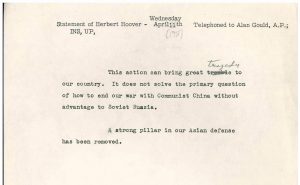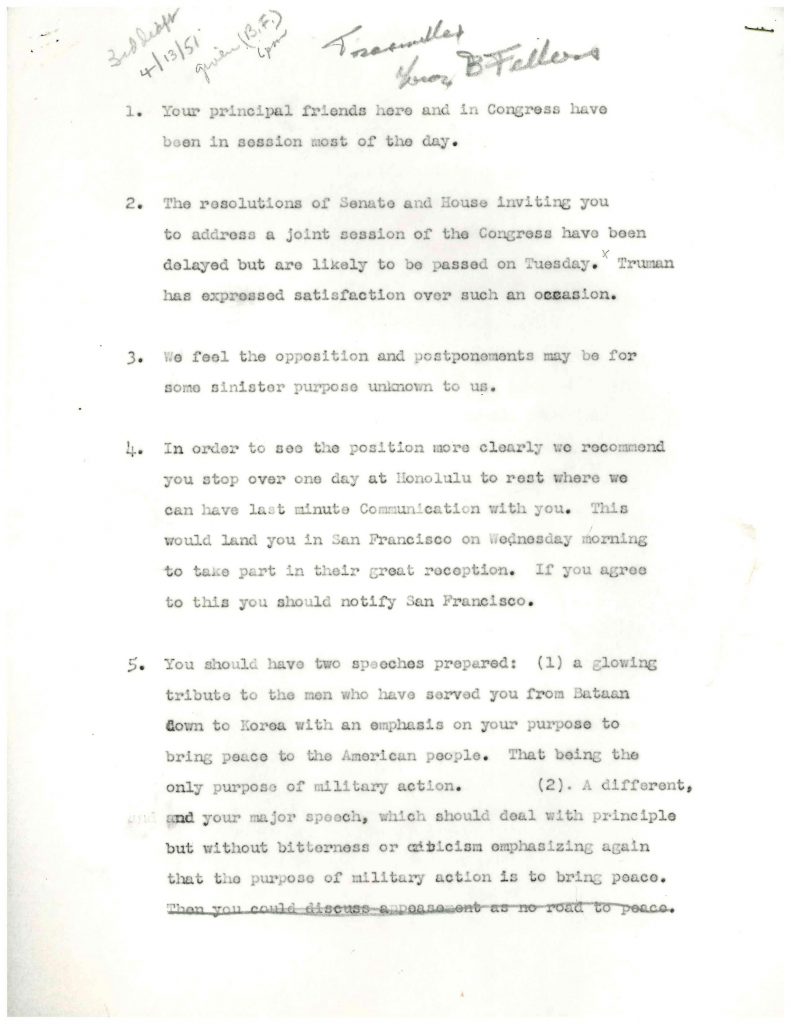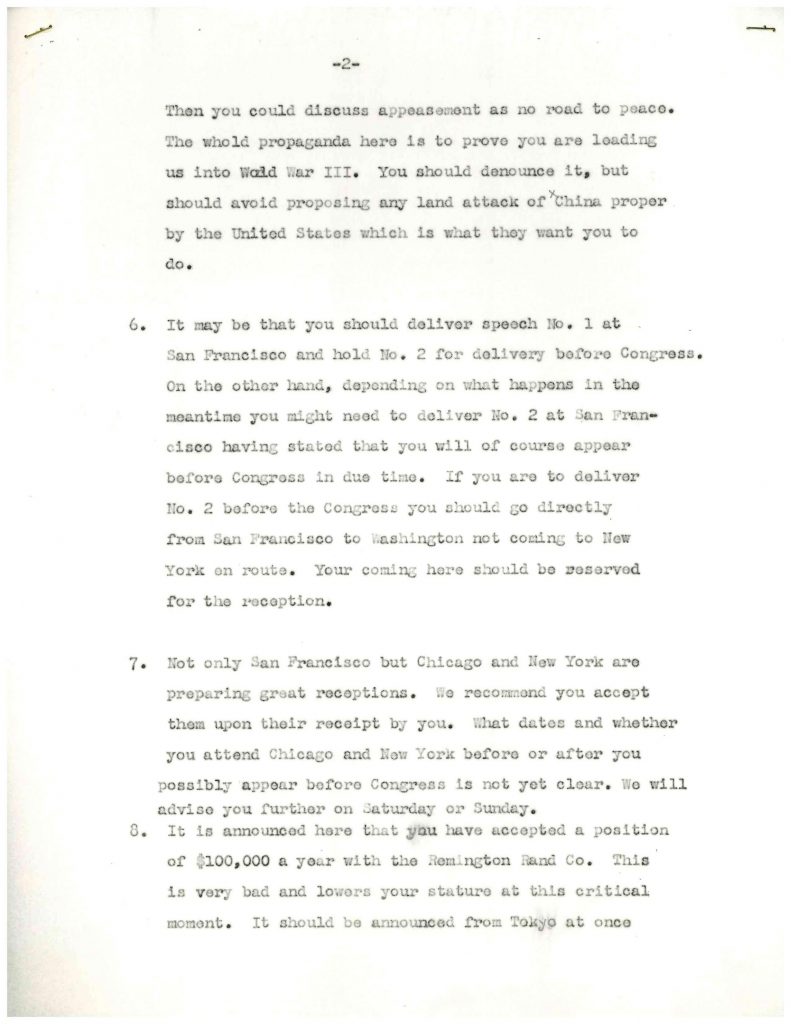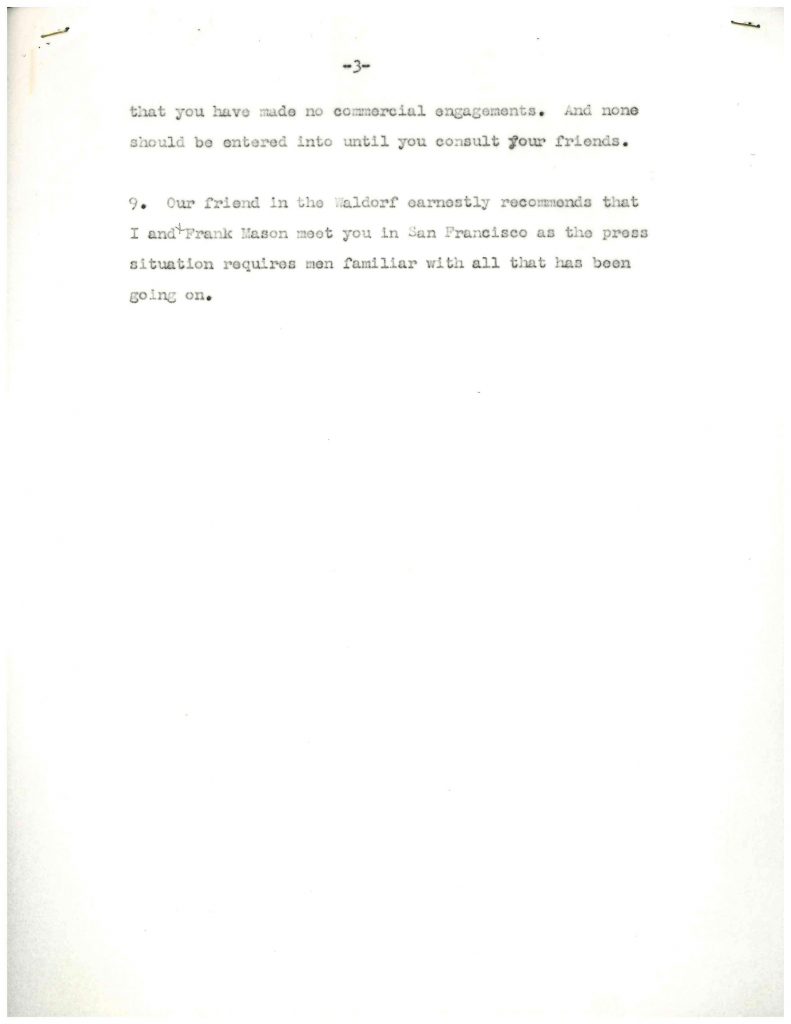Upon learning of MacArthur’s firing, Hoover released this statement. He criticized the action without naming or personally attacking the president.

Hoover found himself stuck in the middle of these two warring factions. On one hand, Truman was a close ally of Hoover’s, and both men worked closely together to help rebuild Europe after World War II. On the other hand, Hoover and General MacArthur were friends too.
Hoover felt he had to intervene somehow, and decided to do so by helping MacArthur recover from his abrupt dismissal. Hoover knew that if he did not act, MacArthur might say something that could hurt any future political career and tarnish his reputation forever. Hoover also knew that the headstrong MacArthur would not listen to anyone else. This was a make-or-break moment for MacArthur’s legacy, and despite Hoover’s friendship with Truman, Hoover refused to let MacArthur, a man he considered a military genius, go down in flames.
Hoover sent a letter to MacArthur with specific instructions on what to do next. He told him what to say in public statements, where to travel on his journey home, whom to meet with, and how to behave. Hoover advised MacArthur to not attack President Truman and instead offer glowing statements about both the U.S. Army and the men that he served with. Hoover arranged for MacArthur to deliver a speech in front of Congress, and organized parades that would greet MacArthur on his trip back to Washington.
Hoover did everything he could to help MacArthur exit with dignity. After sending this letter, all Hoover could do was hope MacArthur would listen.
Read Hoover’s instructions. What do you think of them? What would you change?
Is it appropriate for a former President to assist somebody whom the current President holds in contempt?
1. Your friends here and in Congress have been in session most of the day
2. The resolutions of Senate and House inviting you to address a joint session of the Congress have been delayed but are likely to be passed on Tuesday. Truman has expressed satisfaction over such an occasion.
3. We feel the opposition and postponements may be for some sinister purpose unknown to us.
4. In order to see the position more clearly we recommend you stop over at Honolulu to rest where we can have last minute communication with you. This would land you in San Francisco on Wednesday morning to take part in their great reception. If you agree to this you should notify San Francisco.
5. You should have two speeches prepared: (1) a glowing tribute to the men who have served you from Bataan down to Korea with an emphasis on your purpose to bring peace to the American people. That being the only purpose of military action. (2) A different, and your major speech, which should deal with principle but without bitterness or criticism emphasizing again that the purpose of military action is to bring peace.
Then you could discuss appeasement as no road to peace. The whole propaganda here is to prove you are leading us into World War III. You should denounce it, but should avoid proposing any land attack of China proper by the United States which is what they want you to do.
6. It may be that you should deliver speech No. 1 at San Francisco and then hold No. 2 for delivery before Congress. On the other hand, depending on what happens in the meantime you might need to deliver No. 2 at San Francisco having stated that you will of course appear before Congress in due time. If you have to deliver No. 2 before the Congress you should go directly from San Francisco to Washington not coming to New York en route. Your coming here should be reserved for the reception.
7. Not only San Francisco but Chicago and New York are preparing great receptions. We recommend you accept them upon their recepit by you. What dates and whether you attend Chicago and New York before or after you possibly appear before Congress is not yet clear. We will advise you further on Saturday or Sunday.
8. It is announced here that you have accepted a position of $100,000 a year with the Remington Rand Co. This is very bad and lowers your stature at this critical moment. It should be announced from Tokyo at once that you have made no commercial engagements. And none shall be entered into until you consult your friends.
9. Our friend in the Waldorf earnestly recommends that I and Frank Mason meet you in San Francisco as the press situation requires men familiar with all that has been going on.


